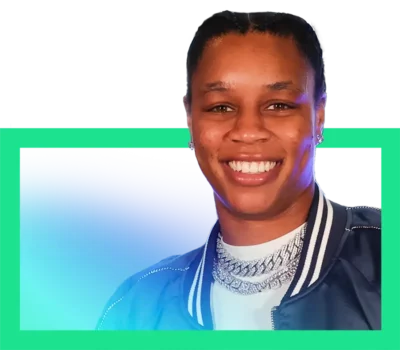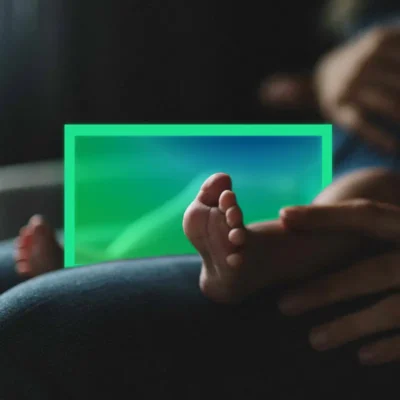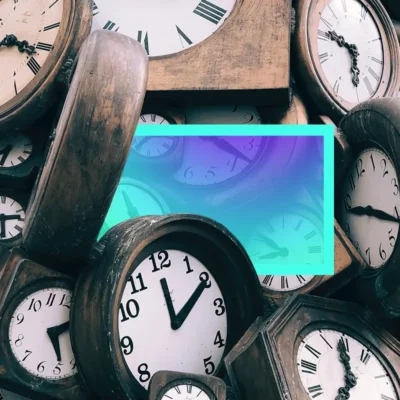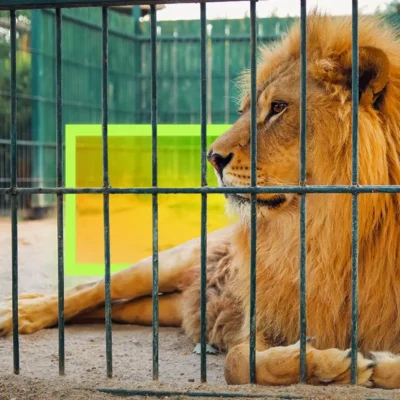Finding possibility in life’s forced pauses
As a WNBA player, AD is used to saying, “I’m good” as an automatic response, no matter the injury. It’s what allows them to be a successful athlete, and to wrap their whole self around that identity. But when basketball is fully stripped away from them, they have to look inward to explore who they are — and the full range of identity available to them.
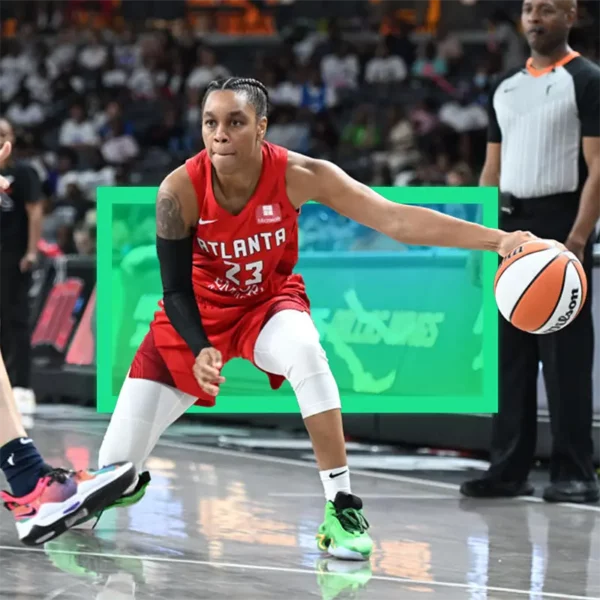
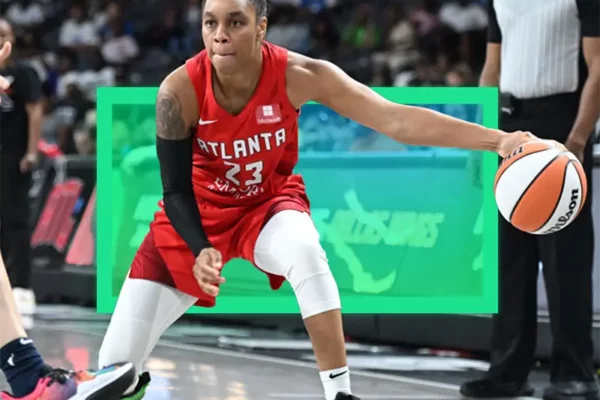
Table of Contents:
Transcript:
Finding possibility in life’s forced pauses
AD: The crowd is super loud. The court feels electric under the bright lights. Sweat drips from my forehead as I sprint to the other side of the court. I glance up at the scoreboard. We’re behind. But we’re still in this.
ROHAN GUNATILLAKE: AD is a WNBA player who spends their life committed to their love of basketball. Their unrelenting passion for the sport means that, as they grow up, being a basketball player feels like their whole identity. In this week’s episode, AD shares the story of what happens when basketball is taken away from them, and they learn how our identity doesn’t have to be all or nothing. AD discovers that there’s a whole spectrum of ways of being available to us, and many ways we can express who we are.
In this series, we combine immersive first-person stories, breathtaking music, and mindfulness prompts so that we may see our lives reflected back to us in other people’s stories. And that can lead to improvements in our own inner lives.
From WaitWhat, this is Meditative Story. I’m Rohan, and I’ll be your guide.
The body relaxed. The body breathing. Your senses open. Your mind open. Meeting the world.
AD: I stare up at the clock on the front wall of my Social Studies classroom. “30 more minutes.” I run my hand along the edge of my desk. Feel the weird scrapes and scratches that have been dug into the wood. My foot bounces impatiently against the floor. I’m wearing the same shoes I wear everyday: blue and white Carmelo Anthony Jordans. They’re busted up, but they’re my favorite. And they’re ready. I’m ready.
I’m 13 years old, and I can’t wait for school to be over.
Our teacher goes over what we’ll do next class. What our homework will be. We’re supposed to copy down the Preamble to the U.S. Constitution. But I already did that. I’m always the first one done because I want to be the first one out the door.
There are about 20 kids in my class. We sit in five rows, four desks each. I’m always in the front. Everyone else has their head down, but I’ve already finished. And my eyes go back to the clock.
10 more minutes. It’s like a countdown. I’m excited. I feel a rush go through my body.
Everyday, I look forward to that bell ringing. Because as soon as school is done, I can go outside. I can play basketball with my friends. And I love basketball.
Whether I’m having a good day or a bad day, basketball is something I can always go to. I can count on it to bring me through. Basketball is who I am.
Man, I’m just so excited to get home and play!
“TJ, I’m open!” My younger brother TJ dribbles the ball around the half-court in our backyard. I stand with my arms in the air, my feet planted. I feel the breeze through the open sides of my sleeveless t-shirt. My hair is in cornrows. My mom tells me to put my hair in a ponytail. But this just feels right.
The court is filled with kids from the neighborhood. This crew knows how to come here every day after school. We take turns playing pickup. We lowered the goal to about seven feet because we like to dunk. It’s all boys and me.
As usual, I’m team captain. But TJ still won’t pass the ball.
“I’m the best out here, I don’t need to pass,” he shouts. I laugh. He laughs too. That’s TJ. He’s a shooter. We’re only 14 months apart and we just click. We’re always together. He’s a great athlete. But his main sport is football. I’m all about basketball.
TJ squares his shoulders, looking up to put up a shot, but the defense is all over him. I wave my hands. Finally, he passes the ball. I dribble — one, two, and I drive to the basket. A taller kid tries to block. I palm the ball and leap into the air. Boom! I dunk on him. “Block that!” I shout as the goal shakes back and forth. It doesn’t stop shaking.
My dad is grilling on the patio nearby. He wipes his hands on his apron. “That’s my girl!” he calls out. I try to smile, but it’s more of a grimace. Something about that, about being called girl, it doesn’t feel right.
But I focus on the game. We play for hours. When the other kids are gone, I train with just me. I get shots up. Working on my dribbling skills. I run from one end of our big yard to the other, just to stay in shape.
I eat, sleep, and crave basketball. It’s my first love. It’s more than what I do. It’s who I am. My whole identity. And I give it all I’ve got. Being a ball player is the only thing I know how to be.
GUNATILLAKE: There is a real passion here, an absorption into what AD loves. It becomes their identity. It’s human to have something that can completely absorb us. Oftentimes, it’s work, or family. What comes up for you when you reflect on where you give your all, or where you stake your identity? What about it gives you joy? And as AD continues, let’s be mindful of the tension that may come with investing our whole being into something outside ourself.
AD: I follow my dad through the hospital’s intensive care unit. Nurses walk by with clipboards. Monitors beep from other rooms. My Jordans squeak on the floor. I’m a sophomore in high school. I came straight here from a game.
We stop at a sliding door toward the end of the hallway. My dad asks, “Are you ready to see him like this?”
“Yeah,” I say. “I’m good.”
But when I walk into the room, I don’t know that I am ready for what I see. My brother TJ is in the bed wearing a pale blue hospital gown. His head is wrapped in a thick white bandage. He has all these needles in his arm: The IV, the blood pressure machine, the tools that make sure his vital signs stay good. He looks tired. The operation to remove his brain tumors has left him weak.
I sit in the chair next to my mom and sister and lean over, “TJ, hey, TJ,” I say quietly. He opens his eyes a little. “I scored 33 points for you. We won.”
He looks super groggy. “Want me to get you some mac and cheese?” I ask. His eyes widen. “What’s mac and cheese?” he asks. He breaks out a big, goofy grin.
I burst out laughing. He’s so out of it, but he’s still TJ. We all laugh. We need this.
But as I look at my brother, I think he must be so sad. He can’t play football. He’s played since he was four years old. It’s everything to him.
Seeing TJ like this brings up a whole spectrum of feelings that I don’t have words for. The idea that he lost something he loves so much. The idea that something like this could ever happen to me, that I would have to walk away from my sport, my identity. I push that thought away. It’s too scary.
I double down on my training. I focus on what I know how to do. I’ll keep winning games for T.J. And that’s what I do. For me, there’s basketball and nothing else.
I scramble for a rebound. I stop the other player from getting the ball. My stance is wide. Everything is a blur of different colored jerseys. The black and white ones belong to the other team, the Las Vegas Aces. The teal ones are my team, the New York Liberty. It’s my first year in the WNBA. I’m 22. I made it. Here we are.
The crowd is super loud. The court feels electric under the bright lights of the Westchester County Center. Sweat drips from my forehead as I sprint to the other side of the court. I glance up at the scoreboard. We’re behind. But we’re still in this.
My teammate shoots me a pass. I start dribbling down the court. My heart is pumping. Someone is right on my heels. But I’m faster. I reach the top of the key and jump off my right foot to shoot. As I jump, my hip pops. I land hard. Pain shoots down my leg. It’s excruciating. I try to breathe. But this hurts. It hurts a lot.
Before the next play, I signal my coach. Our team trainer, Terrri, meets me on the sideline in her glasses and black suit. She looks serious. I try to describe how I’m feeling, but all I can say is it hurts. Something’s wrong. Terri gets to work wrapping my hip. I clench my jaw.
My coach walks over. “How’s she looking?”
I grimace. My shoulders tense whenever someone calls me “she.” It still doesn’t feel right. But I push that thought away.
“I want to play. I’m good,” I say.
My coach sighs. “Why do you always say that you’re good? Every day I ask you, ‘How are you?’ You always say, ‘I’m good.’ What does ‘I’m good’ mean?”
I shrug. I’m not sure. I just program myself to always say ‘I’m good.’ No matter what. It’s the mentality that got me here. This isn’t my first injury. I know what I want to do. Push through the pain. Get back on the court. Put a band-aid over it and give it my all.
But I also know this is my job now. I worked so hard to get to this point. If I’m not careful, an injury can end my career. I try not to think about that. I can’t let the fear creep in. I can’t lose basketball. I can’t be not good. Because, honestly, I don’t know if there are other ways I can be.
I stare up at the plain white ceiling of our living room. I hear the low hum of the TV mounted on the wall. The room is cool, but I feel hot, sweaty. Behind the couch I see the door to our bedroom. It’s closed. I’m in the apartment I share with my partner, on an air mattress, where I’ve been since I’ve gotten sick.
My head throbs. My lungs ache. My brain feels foggy. I’m nauseous, and I have a hard time catching my breath, even when lying down.
When I first test positive for COVID in July of 2020, I can’t believe it. I think, there is no way I could have COVID. No way. But that’s only the beginning. Six months later, there’s no signs of improvement. One day, I start to feel better. The next, I’m in sweats and chills. The next, my lungs hurt. The next, I’m vomiting. It’s just nonstop.
I haven’t played a game, or even gone to a practice, in half a year. That’s after missing most of last season because of my hip injury. The thing I never wanted to happen has happened. This isn’t something I can push through. I’m depressed. I’m lost. Honestly, I don’t know what I am.
My phone buzzes. My brother TJ is calling. We talk every day. He always tells me, “You’re going to get through this.” I want to believe him. TJ knows what it’s like to lose his sport. He knows how to stay true to who he is. Without football, he’s still funny. He reads scripture and gets more into his faith. He knows how to be more than one thing. I don’t know if I know how to do that. I think to myself, “Man, how’d you get through something so hard? You’re telling me I’m going to get through this, and I feel like I’m dying.”
I let the call go to voicemail. I’m not ready to talk about all of that today.
My fiance, Taylor, comes in to check on me. She carries a lot for us these past few months. “How’s my husband feeling?” she asks. That’s what she calls me: “husband.” Something about that feels right. But I still don’t know how to answer her question. I don’t have the words for how I feel.
I close my eyes. I’ve been seeing a therapist to help me with the emotional side effects of long COVID. She shows me this tool called an “emotional wheel.” It’s a multicolored circle. Each section of the wheel has descriptions of emotions and how they connect, and ways to be specific when describing feelings. It’s supposed to help me dig deeper. Get beyond saying “I’m good.”
But right now it’s hard. I’ve always been a person of action, not so much a person of words. I look up at Taylor and just mumble, “I’m not good.” I roll over and close my eyes tight.
For my whole life, my identity has been clear. I’m a basketball player. And I’m good. That’s it. But now, I’m neither. So what am I? Nothing? When I look at the spectrum of colors, of emotions, of feelings, I can’t see where I fit in.
GUNATILLAKE: This realization from AD hits hard. Describing our experience in one narrow way can mean we get stuck in thinking our identity is just one thing. But it doesn’t have to be all or nothing. In this moment, invite some curiosity. And, if you can, surrender the labels that you identify with, giving yourself permission to appreciate the full spectrum of how you can show up in the world. Being open to whatever may come.
AD: I sit on the couch at my sister’s apartment in Buckhead, GA. My two puppies, Max and Fendi, play at my feet. They chase each other in a circle, around the long kitchen table. I smile down at them, but I feel weak today. I’m nauseous, and I’ve had sweats and chills. My sister and Taylor sit next to me. I feel their support. We’re all here to watch something together.
Over the last couple months, some filmmakers make a short documentary about me. They film my experience with long COVID. Document my struggle. It’s part of a series about athletes’ stories. And tonight it’s on TV for the first time.
Everyone quiets down as the documentary starts. I see my face on the screen. I hear my voice narrate my diagnosis, my cycle of symptoms, and how I give up basketball for two years. It feels surreal to watch my own story play out, scene by scene. It feels like I’m really seeing it for the first time.
It’s a lot. All the emotions I haven’t known how to process flood through me. I feel an energy in my body, and then it’s like the dam breaks. I start to cry.
Taylor looks over at me. “Are you crying?” she asks. My sister looks at me, too. They both look surprised. Even with everything that’s happened, they haven’t seen me cry in a long, long time.
“Yeah,” I say, through my tears. “I am.”
During COVID, I’m scared to reflect. As an athlete, I always look forward. Think about the next game, the next play, the next basket. I say “I’m good” and I know I’ll be good. But seeing my struggle play out in the documentary, it’s impossible to look away. I can fully reflect on it all. I see and hear how I really feel. And I see myself as a full person. A person with so much more available to them off the court.
I think about my emotional wheel. I imagine the different words that can help me describe what I’m feeling. I take a deep breath, and I say to Taylor, “I feel overwhelmed and defeated. I’m very sad about the things that my body has had to go through. But I’m also happy that I made it this far.”
Taylor and my sister lean in to give me a big hug. I feel their love and support. I show them how I haven’t been good. And they fully accept me.
My phone pings a couple times. I look down and see texts from my teammates. One says, “I had no idea you were going through so much.”
I realize I didn’t even know I was going through so much. I didn’t let myself think that because I thought I had to be one thing. I had to be good. I had to play. I let basketball define me.
But as I sit here with Taylor, and with my sister, I start to look inward. I’m less afraid to explore who I am. And I start to realize that who I am is so much more than basketball. There’s a whole spectrum of things and feelings and emotions that make up my identity. I want to make sure the people in my life know that. I want to make sure that I know that.
I sit in the passenger seat of my dad’s parked car. I can still catch that new car scent. The peanut butter leather seats feel warm in the late afternoon sun. It’s been 11 months since the documentary came out. My dad, TJ, and I are sitting here in the parking lot of an Italian restaurant in Louisville, Kentucky.
We sit here calmly. But my heart is beating fast. My hands feel clammy. I have something I want to ask my dad. I’m nervous. I’ve never tried to have a conversation like this with him before. But I feel ready.
I clear my throat. “Dad, how much are you willing to give up to accept me for me?” It’s a big question. And I have no idea how he’ll respond. My heart is beating quickly. My dad shifts in his seat to look at me. He says, “My whole life.” His response takes my breath away. In his eyes, I see how much he loves me. TJ is quiet in the backseat, but I feel his presence. It’s strong. I go on.
“I’ve been thinking a lot about my gender identity. I go by AD now, not Asia. And my pronouns are they/them.” I tell him this feels right, for so many reasons. It’s who I am. Who I’ve always been.
When I finish, Dad says, “Okay, got it. This is a transition. I’m going to do my best.” He seems excited. Like he’s been waiting for me to express something he always knew.
A huge weight lifts from my chest. My dad reaches over and we hug from our seats in the car. I think of my emotional wheel. There’s so many feelings I can identify. Relief. Joy. Peacefulness. Optimism. Content.
I thought losing basketball for two years was the worst thing to ever happen to me. But it also gives me a chance to step back, and see all of who I am. I now have deeper words to express my true feelings. To talk about what feels right. What feels like me. On and off the court.
This is how my identity expands. Being a basketball player will always be part of me. But basketball doesn’t define me. I’m also a sibling. A friend. A fiancé. It’s not all or nothing. I can lose one part of my identity and still have so much available to me. A whole spectrum of colors on a wheel. A whole list of emotions. A whole bunch of different ways for me to be me.
Rohan’s closing meditation
GUNATILLAKE: Thank you AD. The big theme that most struck me during AD’s story was when they shared about the emotions wheel.
Sitting under the simple “I’m good” was a universe of emotional tones that AD wasn’t always recognizing due to how much importance they put on the need to be steady and consistent.
One of the useful ways that a tool like an emotional wheel might be used in therapy is that colors are assigned to our feelings. So let’s try that now.
Letting the breath be soft and long, let’s tune in to how we are feeling right now.
And instead of giving our feeling a name like I might have invited you to do in the past, today the invitation is to assign it a color.
There’s no wrong answer.
What color are you feeling right now?
Now, resetting. Either with a breath or two. Or with a memory of the most striking thing that happened so far today. And doing the exercise again.
Becoming aware of our mindstate, our emotional tone, our feelings right now as they are. And knowing them as a color.
For me, it’s a cool, icey blue. Hmm actually no, it’s changed, it’s now orange. What is it for you?
We all have our own relationships with our identity.
And what matters to you and what matters to me and what matters to AD will not only be different, but it will also change throughout our lives.
For me right now, the labels or identities of father and husband are more important than others, but in the past, it will have been completely different things that mattered to me and no doubt in the future the same will be true.
But what I have learnt, echoed in AD’s story, is that there can be real freedom when we have a generous relationship with our identities. Holding them, yes, allowing them to serve us, but not holding them so tightly, so that the tightness masks the reasons we held them in the first place.
Thank you AD for what you shared and best of luck in the season ahead.
And thank you.
Be well.
We’d love to hear your personal reflections from AD’s episode. How did you relate to their story? You can find us on all your social media platforms through our handle @meditativestory. Or you can email us at: [email protected].
